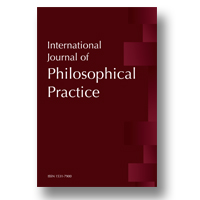|
|
|
1.
|
International Journal of Philosophical Practice:
Volume >
2 >
Issue: 2
Elliot D. Cohen
Philosophy with Teeth:
The Be Wedding of Philosophical and Psychological Practices
abstract |
view |
rights & permissions
| cited by
The American Society for Philosophy, Counseling, and Psychotherapy (ASPCP) was founded on the premise that philosophical and psychological practices are interdependent and mutually supportive. While psychological practice can benefit from becoming more philosophical, the converse is also true. In contrast, the American Philosophical Practitioner’s Association, under the direction of Louis Marinoff, has driven a wedge between these two practices. In this paper, I show how philosophical therapies such as my own Logic-Based modality, and psychological therapies, especially Rational-Emotional Behavior Therapy (REBT) work together synergistically. I hold that the APPA bifurcation of psychological from philosophical practice is artificial, impractical, and self-defeating. Further, I maintain that Marinoff’s position that there is a distinct class of “sane” clients appropriate for the latter form of therapy serves to propagate a dangerous popular stereotype, that clients who “need” conventional psychological therapy must therefore be “insane.”
|
|
|
|
|
|
|
2.
|
International Journal of Philosophical Practice:
Volume >
2 >
Issue: 2
James Stacey Taylor
Comments on Professor Elliot Cohen, “Philosophy With Teeth”
abstract |
view |
rights & permissions
| cited by
This paper comments on Cohen’s “Philosophy with Teeth” (also in this issue), and raises four questions surrounding the relationship between philosophy and psychology, most of which are requests for clarification from Cohen but two of which are more critical in character: Against Cohen’s claim that APPE disavows any intrinsic connection between philosophical counseling and psychology, it is suggested that this still leaves open the possibility of an instrumental connection. And against Cohen’s claim that pure philosophy is “grist for the classroom” or for “stimulating discussions over coffee,” it is maintained that pure philosophy may have more “teeth” than what this suggests.
|
|
|
|
|
|
|
3.
|
International Journal of Philosophical Practice:
Volume >
2 >
Issue: 2
Shlomit C. Schuster
Marinoff's Therapy:
A Critique of His Books on Philosophical Practice
view |
rights & permissions
| cited by
|
|
|
|
|
|
|
4.
|
International Journal of Philosophical Practice:
Volume >
2 >
Issue: 2
Bruce W. Fraser
What’s Love Got to do With It?:
The Epistemic Marriage of Philosophical Counseling and Psychology
abstract |
view |
rights & permissions
| cited by
This paper argues for an intrinsic connection between Logic-Based Therapy (LBT) and empirical psychology, a connection that suggests the need to employ both philosophical and psychological theories in the clinical setting. This link is established by arguing that LBT is conceptually grounded in naturalized epistemology, the view introduced and defended by W. V. O. Quine in the aftermath of his attack on the Analytic-Synthetic distinction. Naturalized epistemology places empirical psychology and logic on the same epistemic foundation, and, it is argued, it is this foundation that both supports the application of logic in the clinical setting and connects logic to empirical psychology. One consequence of this view is that LBT should be understood as providing a theoretical framework for other forms of philosophical counseling, an idea that establishes the logic-based approach to therapy as the sine qua non of the counseling enterprise.
|
|
|
|
|
|
|
5.
|
International Journal of Philosophical Practice:
Volume >
2 >
Issue: 2
James Stacey Taylor
The Future of Practical Philosophy
abstract |
view |
rights & permissions
| cited by
Over the last two decades the practice of applied philosophy has undergone resurgence. It is now common for philosophers to sit on ethics committees in hospitals, or to provide ethical advice to businesses, and many universities and colleges now offer courses in practical philosophy. Despite this, practical philosophy is subject to increasing criticism, with persons charging that (1) it is philosophically shallow, and (2) it has little to offer persons grappling with concrete ethical problems, either because (a) its techniques or too removed from such problems, or (b) because ethical theory is too abstract. In this paper I develop responses to these criticisms, and offer suggestions as to how practical philosophy should be developed.
|
|
|
|
|
|
|
6.
|
International Journal of Philosophical Practice:
Volume >
2 >
Issue: 2
Samuel Zinaich, Jr.
The Future of Practical Philosophy: a Reply to Taylor
abstract |
view |
rights & permissions
| cited by
This response to Taylor’s paper, “The Future of Applied Philosophy” (also included in this issue) describes Taylor’s understanding of the problems that practical philosophy faces; describes Taylor’s responses to these problems, and offers criticisms of his arguments.
|
|
|
|
|
|
|
7.
|
International Journal of Philosophical Practice:
Volume >
2 >
Issue: 2
Samuel Zinaich, Jr.
Gerd B. Achenbach’s ‘Beyond-Method’ Method
abstract |
view |
rights & permissions
| cited by
In this essay, I take up the question of whether Gerd B. Achenbach’s ‘beyond-method’ method provides a suitable approach to counseling for the philosophical counselor. Achenbach maintains that the best method to counseling is one that is beyond any one single system. Many scholars have expressed an increasing dissatisfaction with such a methodology. Although these critiques of Achenbach are helpful, I argue that they do not capture the real problem with his counseling method. After I discuss this additional difficulty, I conclude that it is beyond all dispute that the methods of philosophical counseling should be advanced along different lines.
|
|
|
|





